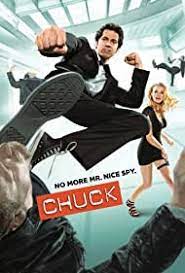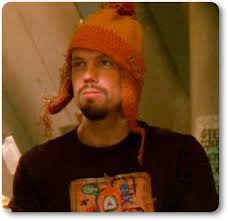(Note: these observations are based on the script. The pilot that aired is slightly different, but what you as a writer need to focus on is the script that got the green light.) The script has a brilliant opening where, if you haven’t seen the one sheet for the show advertising the always charming Zachary Levi in the lead role, you’d think it was all about the character Bryce Larkin, played with a James Bond smoothness by Matt Bomer. Bryce is front and center in a mild action opener–it was on a broadcast budget after all–with an exciting heist. He steals all the info off a mega-computer. We don’t need to understand what it does, just that it’s heavily guarded by the government. He makes a daring escape, but not before sending an email. Who to? Lesson #1You don’t HAVE to open on your main character in a pilot script. You DO have to grab the viewers’ attention from page one. The story moves into the fake action world of a video game where you meet the real hero, Chuck Bartowski. Even his name screams “nerd”. From there on out, it’s funny and smart, quickly spelling out the character’s backstory in bare bones dialogue. Oh, and that email Bryce sent? It was to Chuck, who has no idea what it means. Lesson #2You DO have to introduce the main character pretty early on, but you don't need a lot of cumbersome backstory. A line or two goes a long way. Your audience is sophisticated. They get it without having everything spelled out. The writers, Josh Schwartz & Chris Fedak, beautifully and economically show you more than tell you what Chuck needs to learn to be happy. In dialogue, his sister simply says, “You need to move on,” something the viewer could figure out by watching his interactions with people. Like any good TV series, the lesson isn’t easy, and it’s clear it will take seasons of episodes for him to learn it. Before the end of the teaser, Chuck cracks the code to the email and is instantly bombarded with images. He thinks Bryce sent him a virus, just before his eyes roll back and he passes out. Lesson #3Jump-start your pilot by getting to the inciting incident/catalyst, whatever you want to call it ASAP. Stories are about change, and by page eight, a smart viewer will anticipate Chuck’s life is about to change. Act One opens with the first of flashes he’ll see throughout the rest of the series. He doesn’t know what they mean and we don’t either, but we’re a lot more curious than he is. We’ve already met Chuck’s friends and family in the teaser. In the next few pages, we meet the opposition. Because every story needs to have protagonist and antagonist. A goal for the main character–to move on with his life–and people who are hell bent on stopping him.
What the stolen information, the “intersect,” does is laid out quickly in a couple of lines of dialogue, but we actually see it in action via Chucks’ flashes throughout the first act. Those first twenty-five pages clarify Chuck is a leader at the fictional version of the Best Buy where he works, so not a total loser. He also proves himself to be a sweet, kind guy, likable in every way. We meet the rest of his co-workers, so we know who is going to be in the series. Lesson #4The first act of your pilot, or thirty pages, is where you have to build the world. Every single word counts. Do not waste one line on anything that isn’t vital to the life of the show. There’s time for playing around later on. Most importantly, those pages set the tone of the show. There are plenty of pop culture, geek-adjacent Easter eggs if you know where to find them. There’s even a Fandom page dedicated to “Chuck” that reveals them if you’re curious. And that’s one of the great joys of the show; the voice of the writers comes through loud and clear, connecting with their audience in a special way. (Link is here in case you want to check it out.) The rest of the pilot rolls out the hi jinks and relationships that will be the lifeblood of the show. A scant ten pages from the end, the series is clear; unwittingly, Chuck is the intersect that they’re looking for. They solve the case, but there are many more to come. There’s no doubt by the time the credits roll that this is a series that is sustainable. Lesson #5Paint a clear picture of what your show promises to be week-to-week to give the audience a reason to come back for more. I hear what you naysayers are going to bring up; that “Chuck” was never all that successful in the ratings. True enough, but what it had was a group of fans so passionate, they fought for the show’s survival season after season. Ratings are great, but at the end of the day aren’t fans who love your show what we all want? Here’s the link to the script if you want to read it for yourself. What's a show your recently started watching and would recommend?
0 Comments
Leave a Reply. |
Marla WhiteCoaching writers who are ready to bring their pitch or script to the next level. Archives
September 2023
Categories |


 RSS Feed
RSS Feed